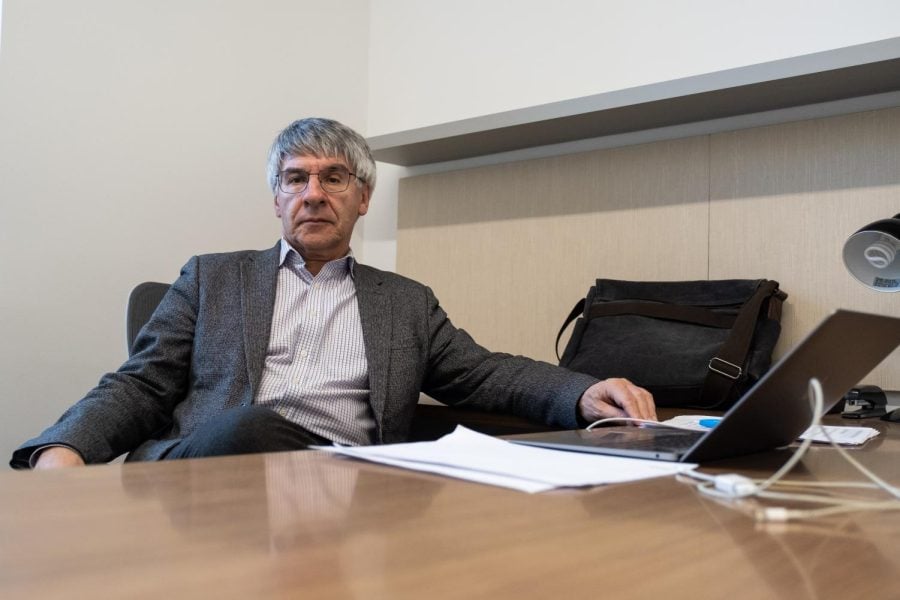Sergey Ivanov teaches Classics at Northwestern after fleeing his home in Russia
Seeger Gray/Daily Senior Staffer
Classics Prof. Sergey Ivanov, who will teach classes in the Classics and History departments in Winter and Spring Quarter, arrived in Evanston earlier this month.
January 24, 2023
When Sergey Ivanov was 11 years old, he found a Greek and Roman antiquity picture book on a beach while on vacation, away from his home in Moscow.
He fell in love with Classical studies soon after completing the book, he said.
“I immediately, right away, felt that this is mine,” said Ivanov, a Classics professor at Northwestern. “At this moment I realized that I am different from other people because I’m interested in this very weird, very separate sphere of life.”
Ivanov studied Classics at Moscow State University for five years before becoming a researcher, and later, a professor at universities in Russia and throughout Central Europe. He specialized in Byzantine studies because of the discipline’s more niche offerings compared to Greek and Roman studies, he said.
Ivanov was not permitted to travel outside of Soviet Russia for research or personal purposes because he was not a Communist Party member. This did not limit his career, however, and he has since authored more than 200 scholarly publications.
The Union of Soviet Socialist Republics ceased to exist on Dec. 31, 1991 and was replaced by the Russian Federation.
“In communist times, the regime demanded that each person should vocally pledge allegiance to the regime,” Ivanov said. “Nowadays the regime is not so severe as to demand vocal loyalty from every single subject of theirs, as yet.”
However, Ivanov said the current Russian government is becoming increasingly more rigid with its policies. After Russia invaded Ukraine in February, he and his family fled to Armenia, and then Germany.
Ivanov said he personally doesn’t know anyone in Russia who supports the war in Ukraine, but added that it is risky to openly criticize Russian President Vladimir Putin. Tens of thousands of anti-war protesters have been arrested since the conflict began.
“We felt it was impossible to live in the country which launched such an unjust and cruel war,” Ivanov said.
According to Ivanov, the Russian government tries not to draw attention to the war and atrocities committed against Ukrainian citizens.
A July poll conducted by the Levada Center, an independent polling company based in Moscow, reported that 76% of Russians supported the military operations in Ukraine.
But, after Russia mobilized an additional 300,000 reservists to fight against Ukraine in September, Ivanov said support for the war decreased dramatically.
“You can pretend nothing is happening until boys are being enlisted and sent to death, so in September, it was impossible to make this pretense anymore, and the level of support for the regime began falling immediately,” Ivanov said.
According to internal polling from the Kremlin in December, just 25% of Russians were in favor of continuing Russia’s involvement in the war.
Ivanov said the most difficult part about leaving Moscow was leaving his friends and colleagues and uprooting his daily life. He specified that he “relocated” to the United States, rather than “emigrated” because he hopes to return to Russia. But, he does not know when he will return.
Before he returns to Russia, Ivanov will teach NU History and Classics department courses Winter and Spring quarter. He is currently teaching Classics 320: Byzantium: Emperors & Hooligans, a course on the history of Byzantine emperors and saints.
Weinberg sophomore Troy Kim said he enrolled in Ivanov’s class to fill a distribution requirement, but he has been “pleasantly surprised” by how much he enjoys the content.
“At the end of the day, history isn’t just recalling facts. People have their own interpretations and readings,” Kim said. “It’s really interesting to get a seasoned veteran’s perspective.”
Classics Department Chair Prof. Sara Monoson said the department was eager to invite Ivanov to teach, as he is a “distinguished scholar” in Byzantium studies.
The department currently does not have any other Byzantium specialists, she said.
“We were eager to (both) help, given the circumstances, and to be supportive of someone who had to make that choice and also very happy to welcome a specialist in that field to our faculty,” Monoson said. “His colleagues are enjoying his company enormously.”
Ivanov said he was more easily able to leave Russia than some of his former associates because he already had colleagues and connections across the globe.
He added that he expects to take on different visiting positions at various universities before he can finally return home.
“I am still very solidly sure that my home is in Moscow,” Ivanov said.
Email: [email protected]
Twitter: @fionaroach03
Related Stories:
— Ukrainian and Russian students are still protesting after nearly eight months of war
— Community members honor Ukrainians lost in conflict with Russia through candlelight vigil


